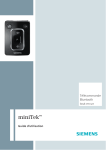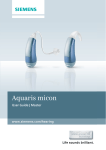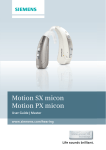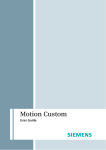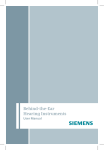Download Siemens eCharger User guide
Transcript
eCharger User Guide | master Content Content Your eCharger 3 Intended use 4 Important notes 5 Notes for batteries 8 How to charge 9 Useful tips for charging 14 Maintenance and care 15 Technical Data 16 Disposal information 18 2 Your eCharger Your eCharger clic ① Charging slots ③ Status / power LEDs ② Cavity for receiver ④ Contact for power supply units, LifeTube, domes ⑤ Power supply with and earmolds country-specific adapters 3 Intended use Intended use This eCharger is intended to charge rechargeable batteries in Siemens hearing instruments. Read and follow the instructions of this user guide to avoid injuries and to protect the eCharger and the hearing instruments from damage. Explanation of symbols Points out a situation that could lead to serious, moderate, or minor injuries. Indicates possible property damage. Advice and tips on how to handle your device better. Read and follow the instructions in the user guide. 4 Important notes Important notes NOTICE Your device is sensitive to extreme heat, high humidity, strong magnetic fields (> 0.1T), X-rays and mechanical stress. Do not expose your device to extreme temperature or high humidity. Do not leave it in direct sunlight. Do not immerse it in water. Do not place your device in a microwave oven. WARNING Choking hazard! Your device contains small parts which can be swallowed. Keep hearing instruments, batteries and accessories out of reach of children and mentally disabled persons. If parts have been swallowed consult a physician or hospital immediately. 5 Important notes WARNING Risk of electric shock! Do not touch the charging contacts in the eCharger. If cleaning is required, disconnect the eCharger from the power supply. CAUTION Risk of malfunction through incompatible parts. Use only the power-supply and country-specific adapter that is provided with the eCharger. WARNING Risk of electrical shock! Do not use obviously damaged devices and return them to point of sale. NOTICE Please make sure that the power plug is easily accessible to remove it from power supply if necessary. ■ This product does not have a power switch. It is turned on when the power cord is plugged in. ■ The eCharger is intended only for indoor use. 6 Important notes DANGER Incorrect use of the rechargeable battery can cause the rechargeable battery to burst. Discharging chemicals are spontaneously inflammable. Risk of overheating, explosion and fire! Do not ignore the red LED on the charger (refer to the LED status table)! Replace the rechargeable battery when its performance reduces considerably (running time under 8 hours). Do not use the rechargeable batteries when the expiration date on the packaging is exceeded. Do not use damaged or deformed rechargeable batteries. Do not open rechargeable batteries. Do not use rechargeable batteries in explosive environments. In the unlikely event of a burst rechargeable battery, keep all parts away from fire and everything that is readily combustible. Return the parts to your Hearing Care Professional for disposal. 7 Notes for batteries Notes for batteries Use only rechargeable batteries that are provided by your Hearing Care Professional. For information about correct battery size check the user guide of your hearing instruments. Make sure the rechargeable batteries are inserted correctly. Fully charge the rechargeable battery before first use. NOTICE To avoid environmental pollution, do not throw batteries into household trash. Recycle or dispose of batteries according to national regulations or return them to your Hearing Care Professional. 8 How to charge How to charge LED legend The LEDs indicate the eCharger status. ① Power LED (green) indicates connection to the power supply. ࡳ ② Status LEDs (multicolor) indicates current charging and drying state of the left/right hearing instrument. Preparation Connect the eCharger to a power supply. The power LED stays on continuously. 9 How to charge Charging and drying The hearing instruments are first charged and then dried. Press the front button to open the eCharger and unlock the lid. Place your hearing instruments into the charging slots (refer to the picture). Please note that the correct function of the eCharger is only ensured if the ear pieces are placed as shown in the picture. Turn the ear pieces inwards. Do not cross the ear pieces. Close the lid of the eCharger. 10 How to charge The hearing instruments are switched off automatically and the charging starts. The status LEDs are blinking. Charging is complete and the drying cycle has started when the status LEDs stay on continuously. Drying is complete when the status LEDs are off. Remove the hearing instruments from the eCharger when you next want to use them. Check if the hearing instruments are turned on. eChargers status LED and state Explanation Power LED is off The eCharger is not connected to the power supply. Check whether eCharger is connected to the correct power supply. Power LED shining green No hearing instrument in eCharger: eCharger is connected to power supply. eCharger is ready to use. Hearing instruments in eCharger: Drying process is finished. Remove hearing instruments from eCharger when you want to use them. 11 How to charge LED and state Explanation Status LEDs blinking green Charging of left/right hearing instrument is ongoing. Leave hearing instrument in eCharger. Status LEDs shining green Charging of left/right hearing instrument is finished. The drying is ongoing. Leave hearing instruments in eCharger. Status LEDs shining red Charging can not be initiated. No hearing instruments in eCharger: Defect or wrong inlay in the eCharger. Ask your Hearing Care Professional to insert the correct inlay for your hearing instruments. Hearing instruments in eCharger: Wrong polarity of both instruments. Check if batteries are inserted correctly. Check if hearing instruments are inserted correctly in charging slots. 12 How to charge LED and state Explanation Status LEDs shining red Wrong polarity of corresponding hearing instrument. Check if battery is inserted correctly. Check if hearing instruments are inserted correctly in charging slots. Status LEDs blinking red Wrong battery in left/right hearing instrument. Charging can not be initiated. Check type of batteries. Status LEDs blinking orange External temperature is too high. The charging process is interrupted to protect the functionality of the rechargeable batteries. Charging continues when the external temperature drops under 45°C (113°F). Place the eCharger in a cooler location. Consult your Hearing Care Professional if you encounter problems. 13 Useful tips for charging Useful tips for charging Correct maintenance of your rechargeable batteries will enhance their life time. Avoid charging above 30° C (86°F). It reduces the battery life time. The rechargeable battery has no memory effect. Charge the battery on a regular basis (e.g. once a day) thus avoiding running it down completely. A charging cycle takes around 6 hours and the following dring cycle 2 hours (8 hours in total). If you need to remove the hearing instruments before the charging cycle is complete, the operation time can be shorter than usual. NOTICE The rechargeable battery will be damaged or unusable when deep discharged. Only leave the hearing instruments in the eCharger when the eCharger is connected to a power supply. Remove the rechargeable batteries from the hearing instruments if you intend not to use them for several days. Charge the rechargeable battery before. 14 Maintenance and care Maintenance and care NOTICE The eCharger will be damaged by dissolver. Do not sterilise or disinfect the eCharger. Use a dry, soft tissue to clean the eCharger. Ask your Hearing Care Professional if the charging contacts need cleaning. 15 Technical Data Technical Data Specifications eCharger Operating temperature: 15 ... 35°C / 59 ... 95°F Operating humidity: 20% ... 75% Minimum air pressure: 70 kPa Storage temperature: –10 ... 40°C / 14 ... 104°F Storage humidity: 20% ... 75% Input voltage: 5 V DC Input current: < 0.5 A Protection against electric shock: class II Against ingress of water: IP XO (ordinary) Specifications rechargeable batteries p312accu, p13accu; provided by Power One Operating temperature (in hearing instrument) –20 ... 60°C / –4 ... 140°F Storage temperature (average) 10 ... 26°C / 50 ... 79°F 16 Technical Data Technical data - Country-specific power-supply Kuantech Model KSAA0500080W1UV-1 Kuantech Model KSAS0050500080D5D Input voltage: 100-240 V AC Input current: 0.18 A RMS MAX Input frequency: 50-60 Hz Output voltage: 5 V DC Output current: 0.8 A Fuhua Model UE10W-050080SPC Input voltage: 100-240 V AC Input current: 0.15 A RMS MAX Input frequency: 50-60 Hz Output voltage: 5 V DC Output current: 0.8 A 17 Disposal information Disposal information Within the European Union, the marked equipment is covered by "Directive 2002/96/EC of the European Parliament and of the Council of 27 January 2003 on waste electrical and electronical equipment." Amended by "Directive 2003/108/EC" (WEEE). Recycle devices, batteries and accessories according to national regulations. With the CE marking Siemens confirms compliance with the European Directive 2006/95/EC on electrical equipment designed for use within certain voltage limits. With the CE marking Siemens confirms compliance with the European Directive 2004/108/EC on electromagnetic compatibility. 18 Disposal information Risk mitigations (not for printing) M15, M20 | choking | ACC 5 M20, M214 | heat humidity | ACC | bis D7 5 M28, M213 | environmental pollution | bis D8 8 M92, M228 | damaged device | ACC with power supply 6 M217 | electric shock | eCharger 6 M219 | incompatible parts | eCharger 6 M226 | exploding battery | eCharger 7 19 Document No. A91SAT-01097-99T##-#### ## Order/Item No. ### ### ## | Master Rev03, 09.2014 © Siemens AG, ##.2014 Legal Manufacturer Siemens Audiologische Technik GmbH Gebbertstrasse 125 91058 Erlangen Germany Phone +49 9131 308 0 www.siemens.com /hearing




















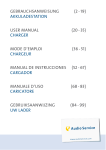
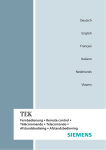
![[Télécommande Mini Blu]](http://vs1.manualzilla.com/store/data/006492990_1-7dc24fc0209550f63dc1cec60b36cc76-150x150.png)
